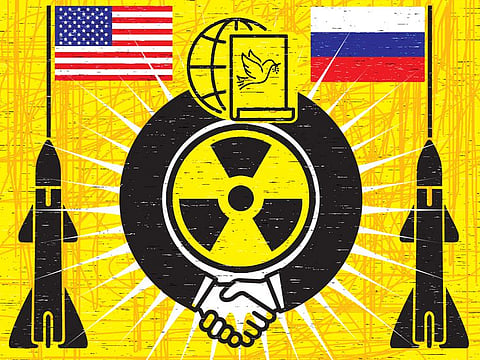A plea to save the last nuclear arms treaty
Extending the New Start agreement would help halt the spread of nuclear weapons

The relationship between Russia and the United States has been mired in crisis for much of the past decade. Communication once considered routine has been cut off, deepening mistrust and making it more difficult to reduce tensions and avoid miscalculation. The current state of affairs does not serve the strategic interests of either country, and it puts global security at risk because Russia and the United States are the only countries that possess enough nuclear weapons to destroy each other — and all of humanity.
Rebuilding mutual confidence and putting United States-Russian relations on a safer track will be a challenging long-term endeavour, given the political climates in Washington and Moscow. But the two countries have a chance to head off even more instability by extending the 2010 New Strategic Arms Reduction Treaty (Start), which expires in one year, on February 5. While 12 months may seem like a lot of time, in diplomatic terms and in the present environment, the clock is ticking fast.
The United States and Russia can avoid a senseless and dangerous return to nuclear brinkmanship if they act soon. There is no reason to wait, and extending the treaty, known as New Start, is the place to begin.
Today, geopolitical tensions are rising and the major powers are placing a renewed emphasis on the role of nuclear weapons in their military strategies.Madeleine Albright, Ex-US secretary of state and Igor Ivanov, ex-Russian foreign minister
With the unfortunate dissolution of the Intermediate-Range Nuclear Forces Treaty last year, New Start is the only agreement still in place that limits the size of American and Russian nuclear forces. It also provides vital verification and transparency measures, including onsite inspections, that have helped foster strategic stability. The treaty allows for a five-year extension if the leaders of both countries agree. President Vladimir Putin and President Donald Trump should seize this opportunity.
Our countries survived the nuclear dangers of the Cold War through a combination of skilled diplomacy, political leadership and good fortune. The fall of the Berlin Wall did not eliminate those dangers, but the years that followed saw continued progress on arms control, a sharp drop in nuclear peril and a reduced reliance on military means for addressing potential conflicts.
Today, in contrast, geopolitical tensions are rising and the major powers are placing a renewed emphasis on the role of nuclear weapons in their military strategies. Experts are suddenly talking less about the means for deterring nuclear conflict than about developing weapons that could be used for offensive purposes.
The folly of nuclear war
Some have even embraced the folly that a nuclear war can be won.
Late last year, we met in Vienna with other former foreign ministers from more than a dozen countries, as part of the Aspen Ministers Forum, to review the global security landscape and examine these trends in depth. We emerged from these consultations deeply troubled by the possible worldwide consequences of an accelerating global arms race, the increased risk of military incidents and the degradation of arms reduction and non-proliferation agreements. We believe that the world needs to move in a new, less hazardous direction.
As a result of that meeting, we and 24 other former foreign ministers are now issuing a statement calling upon leaders of all countries to counter the uncertainties posed by nuclear weapons more urgently. The means to address these dangers are at our disposal, but they can be carried out only through wise leadership. During the Cold War, the world proved that well constructed, balanced and faithfully implemented treaties, political commitments and norms of behaviour can effectively reduce tensions and the likelihood of conflict.
The dangers of miscalculation
This spring, 190 nations will gather in New York on the 50th anniversary of the Nuclear Nonproliferation Treaty to review current nuclear risks and proliferation challenges. Extending New Start would send a signal to the rest of the world as other countries consider their responsibilities to help halt the spread of nuclear weapons. It could also lay the foundation for increased international cooperation in the next decade.
The recent escalation of attacks between the United States and Iran demonstrated how quickly the lack of guardrails can move us to the brink of war. Amid the erosion of multilateral agreements and diplomatic channels, we came close to calamity. The dangers of miscalculation are too grave for leaders to resort to ambiguous communication, threats and military action.
In the years ahead, the security landscape will be made only more challenging by emerging technologies and their interplay with conventional and nuclear capabilities. So it will be crucial to create a revitalised spirit of diplomacy based on a shared understanding of the dangers, and ways to mitigate potential sources of harm. As former foreign ministers, we pledge to continue speaking out on this issue and do our part in this effort.
Also Read: A new nuclear arms race has begun
Right now, the most important thing to do is extend New Start. Russia has indicated, at the highest levels, its willingness to do so. All that President Trump needs to do is agree. Legislative approval is not required.
Time is critical. Doing nothing while waiting for a “better” agreement is a recipe for disaster: We could lose New Start and fail to replace it. The treaty’s agreed limits on nuclear arsenals are too important to be put at risk in a game of nuclear chicken.
Moreover, we have an opportunity to improve security and rebuild trust between the world’s two great nuclear powers. It must not be thrown away.
— Madeleine Albright was the US secretary of state from 1997 to 2001. Igor Ivanov was the Russian foreign minister from 1998 to 2004.
Sign up for the Daily Briefing
Get the latest news and updates straight to your inbox



